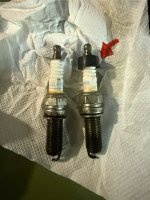Just finished servicing our 121k 4x4 TwinAir, as no service history ( )
)
Oil, filters and plugs done. Everything pretty clean so hopefully it’s been looked after.
Plugs were a bit of a struggle… finally manage after some penetrating oil applied. One of the plugs had a little rubber collar around the end. Nothing appeared to have detached from the coil packs. Reassembled and running fine.
I’m guessing it’s a rubber insert from a previous plug socket. Thought I’d better check it’s not a critical component unique to the TA engine!
Oil, filters and plugs done. Everything pretty clean so hopefully it’s been looked after.
Plugs were a bit of a struggle… finally manage after some penetrating oil applied. One of the plugs had a little rubber collar around the end. Nothing appeared to have detached from the coil packs. Reassembled and running fine.
I’m guessing it’s a rubber insert from a previous plug socket. Thought I’d better check it’s not a critical component unique to the TA engine!


